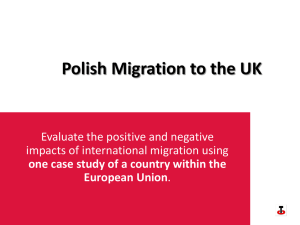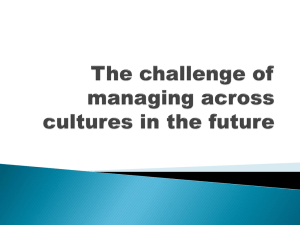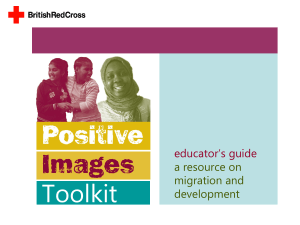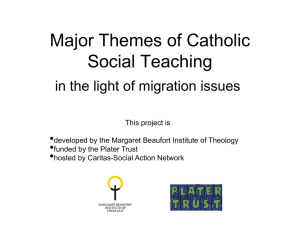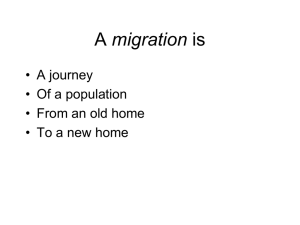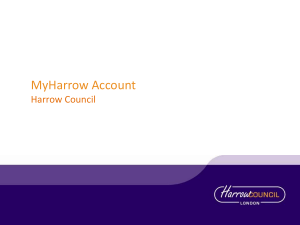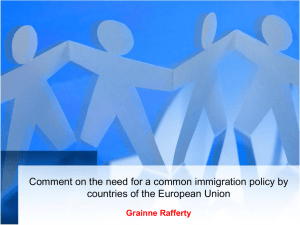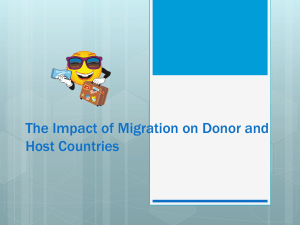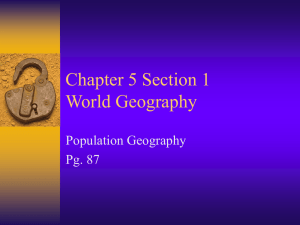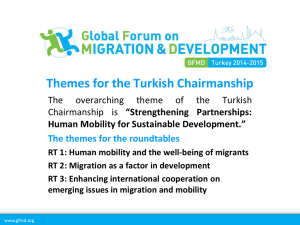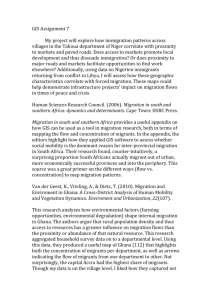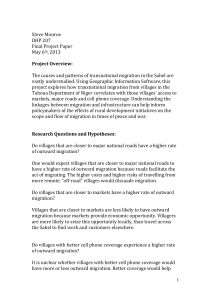PowerPoint Sunusu - İstanbul Göç-Der
advertisement
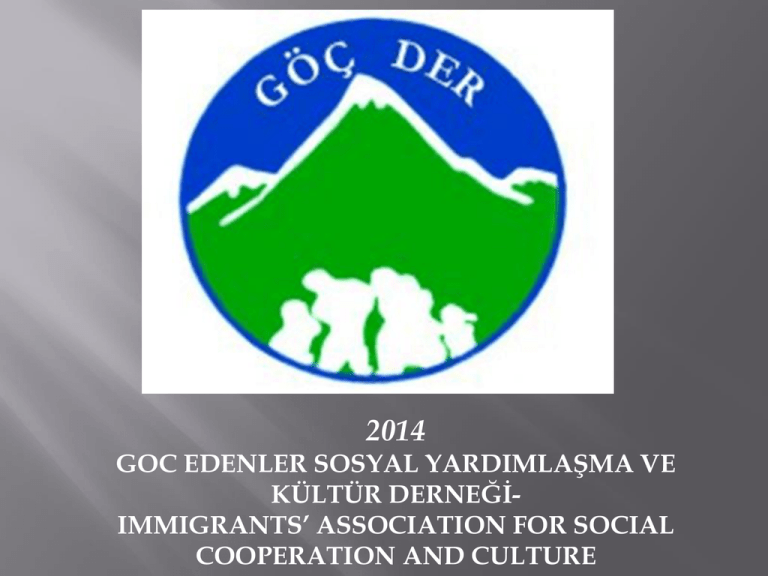
2014 GOC EDENLER SOSYAL YARDIMLAŞMA VE KÜLTÜR DERNEĞİIMMIGRANTS’ ASSOCIATION FOR SOCIAL COOPERATION AND CULTURE What is Forced Migration ? According to William Peterson, • Migration occurring without people’s will and resulting from the problems experienced in a region or from the environmental conditions making it hard to live in a region According to modified UN definition of IDPs, • “the internally displaced are the persons or groups of persons who have been forced or obliged to flee or to leave their homes or places of habitual residence, in particular, as a result of, or in order to avoid the effects of, armed conflict, situations of generalized violence, violations of human rights or natural or human-made disasters, and who have not crossed an internationally recognized state border” Batman-Dervisan Village In Turkey • At the harsh time of conflict between the Turkish state and the Kurdistan Worker’s Party (PKK) the Turkish army forces evacuated villages and hamlets with the aim of undermining the popular support and logistic assistance attained by PKK from Kurdish people İzmit They had to migrate without any preparation . In one night or for some of them, just in a couple of hours they have to leave their home and villages. Batman • Some of provincials and sub-provincials in which intense evacuation existed: Lice, Kulp, Cizre, and the center of Sirnak- in Southeast Anatolian • The number of evacuated villages: 3438 • The approximate number of forced migrants (Internally Displaced Persons): 3.5-4 million İzmir-Torbali Bursa-Karacabey Following the evacuation: • Being subjected to live in outskirts of big cities of the region and western metropolises in miserable conditions Adana-Karataş-Tuzla • At the beginning: Deprived of right to live, right to resettlement freely, benefiting from educational and health care facilities and also oppurtunities of employment in places they have migrated to. Van • The children of forcibly displaced families are mostly deprived of children’s basic rights and most of them are deprived of educational opportunities because of lack of identity card, language and poverty problems etc. İzmir-Torbalı İstanbul Fatih In the resettled cities most of the children have to work in miserable conditions and in the informal sectors in order to survive and contribute to household economy. Bursa Pictures from their living areas after displacement The scenes of poverty and deprivation Immigrants’ Association for Social Cooperation and Culture (GOC-DER) • Objectives : • Founded in April 27th, 1997 after a period of intensified practices of massdisplacements • A member of Migration Platform which is composed of Amed Goc-Der, Van GocDer, Akdeniz Goc-Der since 2008 and this year Göç-Der Cizre has been established and nowadays we are trying to have Goc-der in İzmir one more. - to provide cooperation among migrants and voice out their demands for a more humane life - operating as a social network enabling migrants to come together and organizing public network in order to publicise the tragedy experienced by millions of people unknown to the public Since 1998 each year the association has arranged the activities of Migration Week in order to put the tragedy of mass-displacement on agenda and make the migration question be debated in search of finding solutions. Conducted projects: • «Literacy Course and Health Seminars For Women» Reading and Writing course for twenty Forced Migrant Women for 5 months «New Horizons For the Forced Migrant Youth » Computer Course was held in order to teach them basic computer skills for finding job «Playroom For Children» In Ayazma, a playroom was established for forced migrant children, in which children learn how to share the common space and time The children shared similar problems try to combat with their traumatic history «Ayazma Health Project» Two physical terapists and a nurse provided health check to the IDPs without health insurance in Ayazma, Istanbul for 4 years twice a week. Free medicine and check up was provided through this project. Several Reports on the Social, Economic, and Cultural Conditions of Forced Migrants in Turkey Some of them: - A report on forced mass-displacement covering Diyarbakır,Van Batman, Istanbul,Izmir and Mersin between 1999-2001 has been prepared. Basing upon interviews with 2139 families, the report includes the causes and impacts of mass displacement on the people. The sample is composed of 17.845 people. - A report on economic, social and cultural rights of Kurdish forced migrants has been published in 2011, which includes interviews with 1541 people in 9 provinces To cover problems experiinced by the victims of mass-dislplacement and bring those problems to the attention of related authorities intellectuals Monthly bulletins on the processand of internal other displacement migration and the situation of the forced migrants were published during the victims a periodical named intense period of migration. “Göç-Der Haber Bülteni” has started its publishing life in June 1998 and left behind its 22nd issue Although it was sued many times during its publishing life it was acquitted of them Our current published reports : • Göz Ardı Edilenler İstanbul’da Yaşayan Suriyeli Sığınmacılar – March 2013 • Türkiye’de Koruculuk Sistemi: Zorunlu Göç ve Köye Geri Dönüşler (The Village Guard System in Turkey: Forced Migration and Returning Back) – June 2013 • Yok Sayılanlar Kamp Dışında Yaşayan Suriye’den Gelen Sığınmacılar – September 2013 Projects in Progress and Marmara Göç İzleme Platformu (Platform of Marmara for Monitoring Migration) • «Migration Stories of Non-Muslims in the 1990s» , an oral history book project including collecting migration stories of Armenians, Asyrians, Ezidis, and Chaldeans • «The determination and mapping of the evacuated, burned and destroyed living areas with the Emergency Rule declared by the state during the years 1984-2000» , a research project for providing the data on the evacuated villages in twenty three cities • «Hard to Stay or Even Harder to Return», measuring the tendency of IDPs towards returning back to villages • Marmara Göç İzleme Platformu (Platform of Marmara for Monitoring Migration) : a platform for monitoring the problems and needs of IDPs during the peace process in Turkey and providing solutions and aid to the IDPs who want to return back to their villages or stay in the host cities - legal assessment of current laws and provisions with regards to needs of those returnees - Kadim Toraklara Dönüş Projesi (Return to Ancient Villages Project ): designed representative villages in Dicle (Xaçek ve Heridan) Immigrants’ Association For Social Cooperation and Culture (GOC-DER) 2014 Halıcılar Cad. Uğursaray Apt. No:92/15 Fatih/Istanbul Tel: 0090 212 635 61 22 Fax: 0090 212 532 77 71 E-mail: gocderistanbul@gmail.com
